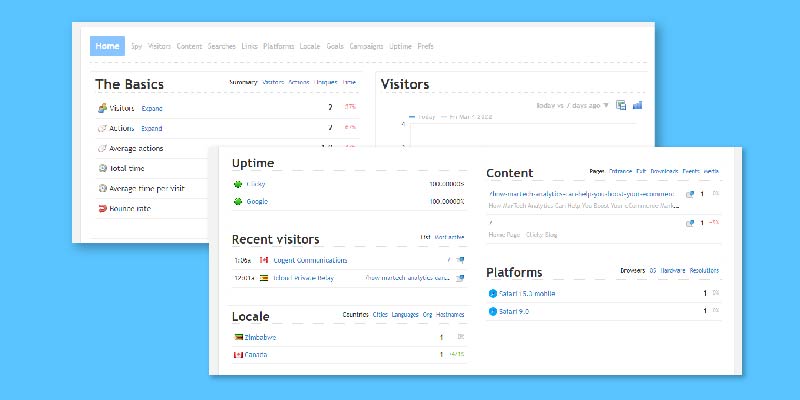25 Best Practices To Optimizing Traffic and Conversions on Your Drupal Site For 2023!

Are you looking to optimize traffic and conversions on your Drupal website? If so, you're in luck. You can follow numerous best practices to help improve your site's performance.
In this blog post, we'll outline 25 best practices to optimizing traffic and conversion on your Drupal site and here they are:
1. Use an SEO tool to improve your site's search engine ranking
2. Add social sharing buttons to ensure maximum social engagement
3. Improve your site's load speed for a better user experience
4. Add unique meta descriptions to every page of your Drupal site
5. Include target keywords in your URLs
6. Make sure your site has a custom 404 page
7. Get rid of the "nofollow" tag on internal links on your Drupal website
8. Make sure your site's loading speed is optimized before submitting it to search engines
9. Set up Analytics properly and know which metrics matter most
10. Audit any broken links on your Drupal site periodically
11.Use social media platforms to improve your site's SEO
12. Get involved with web communities related to Drupal
13. Optimize your email marketing efforts with relevant keywords in the subject line
14. Integrate local keywords into your Drupal website whenever possible
15. Avoid using automated software on social media platforms
16. Take advantage of tools like Google Analytics to track results
17. Repurpose your content for better results
18. Don't delete any bad press about your business
19. Set up a business email address on your domain
22. Understand the difference between value and price
23. Implement social proof
24. Make effective use of images
25. Set up Facebook conversion pixels for your website
26. Speak the language of your customers
27. Create high-quality content at the top of your website
Read on to learn more...
1. Use an SEO tool to improve your site's search engine ranking
There are many good reasons to use an SEO tool on your Drupal website, but one of the most important is that it can help improve your site's ranking in the leading search engines like Yahoo, Bing, Google, etc. An SEO tool will analyze your page content and determine if changes need to be made.

If they do, it will make the necessary modifications automatically. Some of the things that an SEO tool will check for:
- Whether or not you're properly formatting your meta tags and titles
- Whether your site is loading fast enough &,
- If your site has any broken links
2. Add social sharing buttons to ensure maximum social engagement
You must encourage users to share your website on social media sites like Facebook, Twitter, and Google+. So, these buttons should be placed in an area that is easy to spot. Also, it's recommended that the share button or buttons feature images of the most widely used social networking sites like Facebook (of course), Twitter, Google+, LinkedIn, and Pinterest.

3. Improve your site's load speed for a better user experience
It's estimated that 47% of online shoppers will leave a website that takes more than 3 seconds to load. The easy way to avoid this is by optimizing your Drupal website to load quickly. You can do many things to improve load speed, but one of the first things you should do is run your site through Google's Page Speed Insights Tool. This tool will analyze your website and determine what needs to be done for it to load faster.
4. Add unique meta descriptions to every page of your Drupal site
Meta descriptions are used to describe the contents of a page. They also appear in Google search queries. So, it's important that you write unique meta descriptions for every page on your Drupal site. To eliminate duplicate content issues, an SEO tool can be used to automatically create unique meta descriptions for each of your website pages based on their respective titles.
5. Include target keywords in your URLs
All webmasters want more traffic for their websites, so including targeted keywords in your URL is smart enough to achieve this goal.
For instance, instead of naming one of your pages "Drupal vs. WordPress: Which is the Better CMS?", you should rewrite it "Drupal vs. WordPress: Which is the Better CMS for Your Website?" However, you should remember not to overdo it because too many keywords in the URL is considered bad practice by many SEO experts and can even result in your site being blacklisted by Google.
6. Make sure your site has a custom 404 page
A custom 404 page provides an excellent opportunity for webmasters to increase conversions and improve their search engine rankings. By placing a link to a relevant product or service on this page, you'll provide web users with a way to navigate back to content that's of interest to them. Also, make sure your 404 error message is clear and direct.

As mentioned earlier in this post, 47% of online shoppers will leave a website that takes more than 3 seconds to load. If a user comes across a broken link or other problem while viewing your site, they'll look elsewhere for what they're looking for.
7. Get rid of the "nofollow" tag on internal links on your Drupal website
Internal linking is crucial because it keeps all of your pages connected, but don't make the mistake of tagging every link with a nofollow attribute. This attribute tells search engines not to follow certain links when indexing their content. So, for example, if you tag every link on your website with this attribute, Google would never be able to follow them and, therefore, would never know that they exist. By removing these tags from your WordPress site's internal links, you'll ensure that search engine crawlers can discover all of its pages and adequately index them in their search results.
8. Make sure your site's loading speed is optimized before submitting it to search engines
If you've done everything mentioned in this article, but your Drupal website still isn't ranking on the first page of Google, it could be because its loading speed isn't optimized yet. When users type in a keyword related to your site's offering, they should find themselves on your website within 2 or 3 seconds maximum. If this doesn't happen, there's no way they'll stick around and continue browsing through your pages unless, of course, you make an offer that can't be refused, like free shipping or money off their next purchase. So how do you optimize your site's load speed? There are many things you can do depending on your website's platform.
For instance, if you run a WordPress site, you'll want to make sure it has a fast loading time by using a caching plugin such as WP Super Cache or WP Rocket.
On the other hand, if your Drupal site is hosted on Bluehost, they provide integration with Cloudflare so that when someone visits one of your pages, their server will send them only the HTML code and nothing else. This will allow your page to load faster than usual, which means more traffic and conversions for you in the long run.
9. Set up Analytics properly and know which metrics matter most
Setting up Google Analytics correctly can give webmasters insight into what's happening on their website at any given moment, whether it's from organic search or paid traffic sources. You can learn many things depending on what kind of metrics you want to track, but make sure you set up what matters most first. In other words, if your goal is to increase conversions and generate more leads, focus on setting up conversion goals. It would be best if you also thought about adding events tracking as well as e-commerce tracking since this will give marketers a better idea of how their Drupal site's performing.

If you're unable to set up Google Analytics correctly for any reason whatsoever, there's an alternative known as Clicky. While this program doesn't offer all the features that Google Analytics does, such as advanced reporting and data visualization tools, it provides essential information such as your website's traffic sources. These keywords are getting you the most clicks, your monthly page views, and your monthly page views top referrers.
10. Audit any broken links on your Drupal site periodically
Broken links happen when a page's URL is changed or its content is deleted, but someone fails to update all of its backlinks. This mistake happens more often than you think since webmasters don't keep track of their website's backlink profile regularly. The easiest way to find these mistakes is by using an online tool such as Xenu's Link Sleuth (there's also one for Firefox browsers), which will crawl through your site automatically to make sure it isn't suffering from broken internal or external links.
If it finds any errors, it will show them to you along with their page and anchor text which you can then use to update each one of them.
11. Use social media platforms to improve your site's SEO
Simply put, if your Drupal website doesn't have a Facebook page or Twitter profile where people can follow what you're up to via updates and special offers. Then, chances are it won't rank very high on Google regardless of how optimized it is for search engines.
Having a widespread social media presence also gives businesses the ability to build more relationships. They could reach out directly to their fans, sharing valuable information with them about products and services that they might find interesting while at the same time letting them know about new blog posts that they can share with their followers as well.
This will help build more brand awareness and increase your site's overall exposure, which means web traffic and sales will grow as a result.
12. Get involved with web communities related to Drupal
If you're serious about marketing your Drupal website. Then it only makes sense that you join some of the major online communities where people discuss topics related to its software, such as Web Hosting Talk, WPHostingForum, and Webmaster World.

By doing so, you'll not only gain more knowledge about things related to search engine optimization, but you'll also make connections with marketers from different industries around the world, which can lead to backlink exchanges and guest posts on each other's blogs. As a business owner who uses Drupal CMS for your website development, you should also consider joining the official Drupal Forum, where you can meet others who work with this CMS on a regular basis.
Do you run your business website on Drupal? Be sure to optimize it for search engines by taking advantage of these 25 best practices!
13. Optimize your email marketing efforts with relevant keywords in the subject line
When sending out emails, marketers have found that including specific keywords in their subject lines gives recipients an idea of what they're about to open up when clicking on them since people are more likely to read emails related to topics that interest them most.

This is also true for email marketing campaigns, which is why many online marketers include words in the "From" field, such as company name or brand name related to what their email is about.
14. Integrate local keywords into your Drupal website whenever possible
If you're running a business that offers products or services in specific regions of the world, then it makes sense for you to optimize your site for regional search engines such as Google Places.

This approach will help increase ranks on these search engines while also giving web visitors the ability to look up businesses based on their location by using maps or zip codes along with more specific criteria such as keywords and hours of operation, which they can use if they want to contact you directly.
However, some marketers ignore this opportunity, which is why they fail to get noticed by people within their own. While organic traffic is definitely significant, this is something that should not be overlooked, no matter how big or small your business is.
15. Avoid using automated software on social media platforms
When you have many customers to manage through the use of social media, then chances are you want that handled as quickly and efficiently as possible. Unfortunately, some people still do it manually, which can be time-consuming and possibly lead to inappropriate information being shared with others by accident. To prevent this from happening, always make sure you track everything before pushing it out through these popular channels.
For instance, if you publish a new blog post within your website's CMS, then search for any keywords related to it on Twitter first before hitting send so new followers will know what they're about to click on. In the end, they'll appreciate having this level of control over their newsfeeds and also enjoy knowing you're a marketer who goes above and beyond when it comes to using social media as part of your business strategy.
16. Take advantage of tools like Google Analytics to track results
When it comes to measuring your website's success, there are lots of different things you can look at in order to make this happen. However, some marketers aren't sure which ones they should use or how often they should be checking them out until it's too late, and they've missed out on countless opportunities to engage with their customers.

For this reason, we recommend that you always use tools like Google Analytics which provides lots of information such as the number of people who visited your site last month or where your visitors came from, such as social media channels. By using these insights, you'll be able to adjust your marketing campaign accordingly, so you don't waste time on things that aren't working.
17. Repurpose your content for better results
Every business has some kind of content, whether it's in the form of an informative blog post, a webinar, or even a video they put together to grab their target market's attention. However, many people assume that publishing this content once is enough to get their message out there. In reality, this couldn't be further from the truth, which is why you need to take advantage of tools like Canva or Easel.ly in order to turn it into a visually appealing image and/or infographic. Then, share these images on all social media channels as well as your website, and you'll start to see a positive return on investment in no time.
Repurpose your content for better results – use tools like Canva or Easel.ly!
18. Don't delete any bad press about your business
Some marketers believe that negative reviews found on sites such as Yelp are harmful to their online reputation. However, if you take the time to read them, you'll see that there's a lot of good information as well, such as what people liked and didn't like about your business.

Because of this, we recommend that you keep everything up for future reference and use it as part of your content marketing strategy. In fact, if the review contains a question from someone wondering whether or not they should bother doing business with you in the future, then consider answering this in your next blog post. Then all you'll have to do is reach out to them via email and resolve their issue right away.
19. Set up a business email address on your domain
In the past, marketers were only able to use their personal emails when trying to grow their businesses. However, this isn't always the case in today's digital world, especially since everyone from potential customers to employees will begin looking for contact information on your website that they can actually use.
For this reason, we highly recommend that you set up professional business email addresses on your domain, so they know exactly who to contact. There are many providers out there, such as MailChimp or Constant Contact, which provide lots of space and even helpful templates for managing email campaigns.
Set up a business email address on your domain with @MailChimp 's 14 free templates.
20. Understand the difference between value and price
One of the biggest mistakes that marketers make is failing to recognize the difference between value and price when it comes down to conversions. Price is how much money they're spending on your product or service, whereas value reflects their overall experience with the company, including the quality of what you're offering.

For this reason, we recommend that you always look at both of these factors in order to determine which ones will lead to a successful outcome before launching new campaigns. In fact, if your marketing team focuses too much on minimizing your costs, then your customers might not get a good deal even if they do buy from you. Click here for a more detailed explanation!
21. Implement social proof
According to the experts at Buffer Social, there are over 150 million active users on Twitter and 1.44 billion registered users on Facebook. Since this is the case, it should be easy for your business to find success if you follow these platforms and monitor them for mentions of your brand name.
To do this, we recommend that you set up alerts in Hootsuite or Mention, which are both free tools that make it simple for marketers to monitor hashtags related to their industry. Once you begin receiving any new posts about your company, reply immediately by thanking them for the mention if they had a good experience with your product or service. This will encourage other potential customers to do business with you even more because of how fast you are to respond.
Implement social proof into your marketing strategy with tools like Hootsuite or Mention.
22. Make effective use of images
One of the most powerful ways to get more opt-ins for your email list is by using eye-catching images on popular social media platforms. By doing this, you'll have a much easier time reaching new customers who are browsing through their newsfeeds at any given moment.
An excellent way to do this is by getting assistance from websites that provide lots of free stock photos, such as Unsplash, Pixabay, or Pexels. To see why they're so helpful.
Make effective use of images when connecting with new customers on social media platforms.
23. Set up Facebook conversion pixels for your website
Since the vast majority of marketers are now using Facebook to market their business online, you must upload one of their conversion pixels onto your website to monitor how many people are actually taking advantage of what you have to offer. This allows you to see which products or services are getting the most attention so you can focus on these in the future.
As a result, we recommend that you do this before launching anything new, so even if it doesn't pan out as expected, at least you'll be able to recover quickly and minimize any long-term losses.
Setup Facebook conversion pixels with a single line of code to get accurate reports on your website conversions.
24. Speak the language of your customers
Countless studies prove that written content can influence purchasing decisions because it's easier for businesses to craft engaging ad copy using words and phrases that their audience will understand. That being said, you have to remember that different demographics prefer different writing styles.
For instance, Generation Xers tend not to respond well to conversational tones unless they participate in casual conversations. Instead, this group prefers an authoritative tone because it gives them confidence that you're knowledgeable about what you're selling. On the other hand, millennials are mostly attuned to informal communication, so you should speak casually to establish rapport with them.
Speak the language of your customers when interacting with them online, so they feel understood…
25. Create high-quality content at the top of your website
While plenty of people would instead purchase products or services without doing any research beforehand, unexpected findings can cause them to be much more likely to make an online purchase. That's why it's constructive for businesses if their websites' homepages contain long-form content packed with fascinating facts related to their industry. This provides individuals with enough information that they'll consider your brand even if they don't take immediate action.
Final Thoughts
Drupal marketers should always keep their finger on the pulse and be aware of what's going on in the industry as well as how this could impact their business. One of the best ways to do this is by using these tips and sharing them with your coworkers to help you plan for upcoming events such as Drupal camps, meetups, and conferences.
Get Help From Our Experts
Online competition is intense these days; thereby, forcing every online entity to enhance its presence online to stay ahead of the curve.
Simply put, an optimized Drupal website earns more Traffic & Conversions!
At Drupal Partners, we provide a Free SEO Audit, which will help you identify the pain points to optimize your website's performance. Our extensive report will cover:
- Technical SEO issues
- Keywords impact on your web pages
- List of online directories
- Utilization of meta tag page descriptions
- Crawl errors
- Site speed
- Optimization of headings with keywords and more...
It is the best time of the year for your website to get an SEO health check!
Customers are seeing a 35-45% boost in revenue, 45% lower cart abandonment rates, and 69 percent more engagement on eCommerce sites as a result of our services.